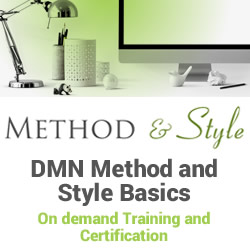The Role of Meaning and the Meaning of Roles
Blog: Strategic Structures
Let’s start with roles. ‘Role’ comes from ‘roll’, as it was on a paper roll where the actor part was written. It is about something prescribed and then performed. But it evolved from roles that were performed as prescribed, through those that were not, to performing roles that had not been prescribed at all.
Roles are about relations. In fact, in Description Logic roles play the same role as relation, association, property and predicate in other formal languages. If John has a son George and is 30 years old, then George is in the role of a son for John, and even 30, although not an actor, plays the role of an age for John. Roles are inherently relational. A relation to itself or to something other. There is never just a role, always a ‘role in’ or a ‘role for’.
Roles are not just relational but are often determined by the dynamics of interactions. Here’s a handy example. The role of this text in the situation of you being in the role of a reader, will be, as assigned by me in the role of a writer, to transfer my thoughts on the meaning of roles, but it would rather trigger the construction of both similar and complimenting thoughts of you, and by doing so will play a different role, which, while evoked by me, is determined by you.
As there is now something about the meaning of roles, it’s time to introduce the role of meaning. If the role is always a role-in, my interest here is in the role of meaning in living and social systems. These systems have some things in common. One such thing is that they have internally maintained autonomy. Such autonomous systems bring forth and co-evolve with their niches. And that happens by creating of meanings which motivate attitudes and actions. But how does meaning come about?
Before meaning, there is the primary cognitive act of making a distinction, bringing up something out of its background, distinguishing a thing of that which it is not. That act determines and is determined by the dynamics of the interaction between the system and its niche (by ‘system’ here I will only refer to systems with internally maintained autonomy). This dynamics is circular and recursive. Roughly speaking, it goes like this:
The act of distinction, the very making of difference changes the making of difference and brings forth “the difference that makes a difference”, in Bateson words, or the “surplus of significance” in Varela words, which is also co-dependant: the sense made changes the sense-making that changes the sense that is made and then brings forth the behaviour changing relation between the sense maker and the meaning of the distinguished element. This results in attitude of attraction, aversion or neutrality (or something more sophisticated like staying put, paralysed by the equal amount of temptation and fear). Or, in other words, the sense-making transcends into value-making. The value-making evolves itself and in downward causality influences the evolution of the distinguishing and the sense-making capability, which is in fact again a distinguishing capability but it is now distinguished as sort of a second-order one.
Before going further, I need to make clarifications on the use of ‘sense-making’ and ‘value-making’. ‘Sense-making’ is giving meaning to what is experienced. Here I use it with an emphasis of the action of making, of the creation, or more precisely, co-creation of sense. It is not that the sense is out there and all we need to do is to disclose it. No, we (or whatever the system in focus is) are the ones that actually make it, the origin is within us, or rather within the dynamics between us and what we interact with.
‘Value-making’ should not be confused with value adding. The system makes a distinction of a higher order in terms of directing its behaviour based on this distinction, hence the choice of ‘value’. It is not specified by the distinguished element, it is determined by the internal structure of the system and the dynamics between the system and the environment it’s structurally coupled with. This and the fact that value-making is a sense-making of a higher-order, is where the preference for ‘making’ comes from.
Only a small part of the environment, a niche, is constantly changing its content, is being interacted with, and actually matters. The niche is not one niche but a network of dynamically changing and influencing each other niches. A family is one niche, but that’s not the family described by somebody knowing all the facts, and not the family which will be invariant for each of the family members. The family as a niche is the subjective construction of interactions, memories, emotions, attention and imagination unique for every member of the family, as long as they consider themselves as such. This could easily exclude actual members and include those that have a lasting experience as such. And the same applies to work circle and friends circle, as to all occasional and recurring encounters, and virtual communities. But then, apart from interactions with other humans, we also have a niche out of the air we breathe, the grass we walk on, the stairs we climb and descend. And all that, changed by us, is changing us and changing the way we change it. But those changes, as long as a system is viable, serve to protect the identity from changing. We take from our niche things to make them into more of ourselves and become better in doing so.
Unlike the air, the grass and the stairs, a family or an organisation are autonomous systems which maintain their identity. They have their own niches. Moreover they are social systems. There are different ways to look at them. One way would be as autopoietic systems of communications, having humans as their niche (Luhmann), and another would be to have humans as both sub-systems and niche depending on weather the processes they participate in are part of the closed network of processes creating the identity of the system in focus. And that can be talked about in terms of the roles humans play.
Now we are ready to see what the role of meaning has to do with the meaning of roles. A living bacterium is at a stage of development where the sense-making has transcended into value-making. It does not only distinguish an environment with low from that with high sucrose concentration but prefers and moves towards the latter. As Evan Thompson put it, while sucrose is a “present condition of the environment, the status of the sucrose as a nutrient is not”, “it is a relational feature, linked to the bacterium metabolism”. And this is how the creation of meaning and roles are co-dependant. The dynamics between the bacterium and its environment, by making the sucrose relevant for the viability of the bacterium, realises the role of sucrose as nutrient.
But that’s not only relevant for cells and living organisms. It’s applicable for social systems as well. A company acts so that to turn some part of the environment into employees, other into clients, partners and so on. And for the same reason as the bacterium – to maintain it’s viability.
Once a formal role of an employee is assigned by a contract, a less formal roles are enabled by different mechanisms. It is now common to refer to such mechanisms as ‘Governance’ or an essential part of it. That part is a meta-role assigned to some people to determine the role of others. One and the same person often plays several roles.
Roles can be determined by formal assignment, by methodology, or by a Governance body but they can be also invented and self-assigned by the actors themselves, as typical for the organisations researched by Frederic Laloux. In that case, the evolutionary nature and the granularity of the roles are both dealing with the pathologies of assigned roles (being status currency, perpetuated even when obsolete, determined by politics and so on) and making organisations more responsive to change. Again the system, by what it does, takes from its environment what it needs to make more of itself, recursively: it turns non-employees into employees and vice versa, and employees take up and leave roles, as determined by the dynamics of their interactions.
And so it seems that the meaning of roles is continuously realised by the role of meaning as a way in which a system generates its niche by asserting itself and maintaining its viability.
Leave a Comment
You must be logged in to post a comment.








